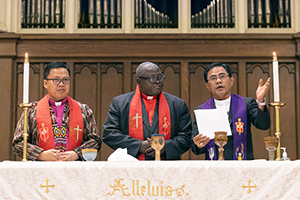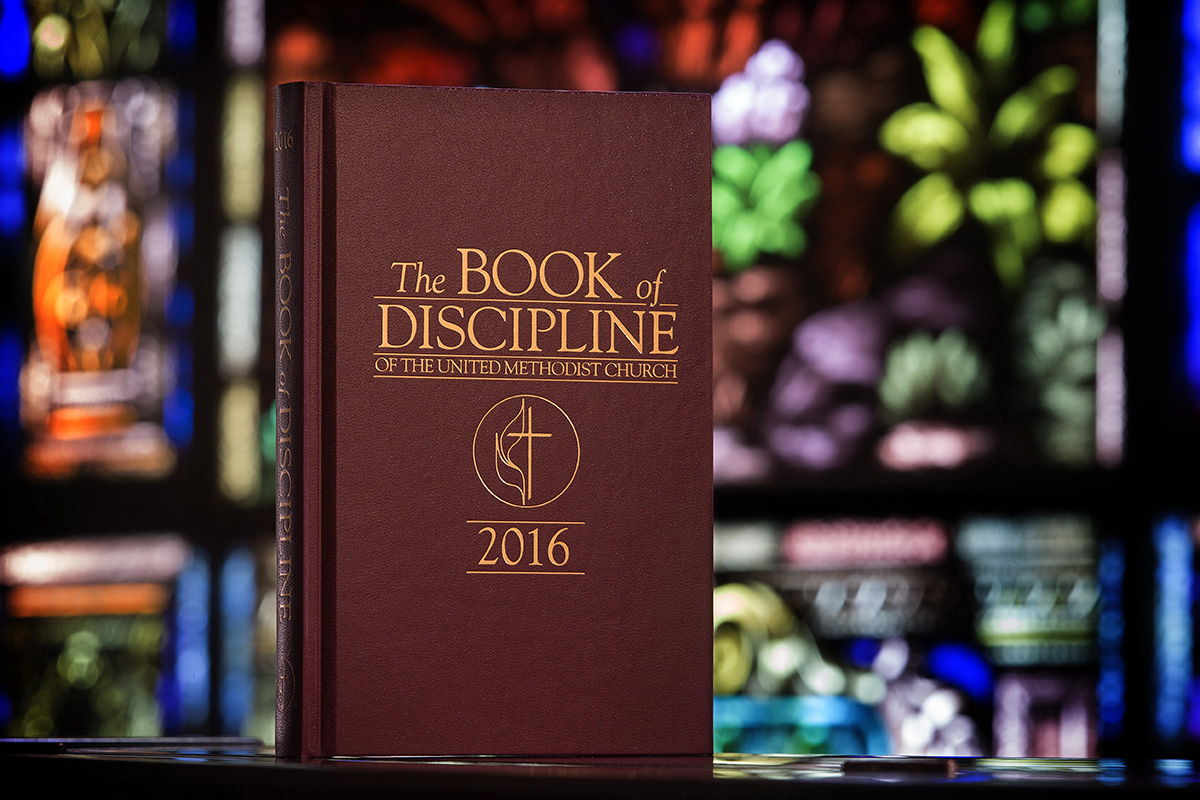Key points
- The United Methodist Church’s Judicial Council responded to questions related to the terms of agency board members and Judicial Council members.
- Because of COVID, eight years have elapsed since the last regular General Conference rather than the usual four.
- The Judicial Council also released rulings on the three items on its spring docket.
The United Methodist Church’s top court said only General Conference can determine how to handle the elections of the court’s membership.
In a separate decision, the Judicial Council also ruled that agency board members elected at the 2016 General Conference can be elected to serve another four-year term beginning at the close of this General Conference.
The rulings were among five the Judicial Council released April 23, the first day of General Conference — the denomination’s top lawmaking assembly that draws lay and clergy delegates from four continents.
At issue in two of the rulings is what the postponement of the 2020 General Conference means for the elections of various church leaders at the just-started assembly.
The Book of Discipline, the denomination’s policy book, establishes terms for many elected church leaders based on the understanding that General Conference will meet every four years. But complications from the COVID pandemic resulted in the postponement of the 2020 General Conference to this year. That means the last regular session of General Conference took place eight years ago.
The Council of Bishops asked the Judicial Council for declaratory decisions related to the terms of agency board members and Judicial Council members themselves. A declaratory decision deals with the meaning, application and effect of church law.
Under the Discipline’s Paragraph 2602.1, General Conference elects Judicial Council members to serve eight-year terms, with staggered elections for its lay and clergy membership depending on the General Conference year. Judicial Council members can serve a maximum of two consecutive eight-year terms, and then must take at least four years off before General Conference potentially re-elects them to the church court.
The bishops specifically asked whether this means Judicial Council members who were originally elected in 2016 must now stand for re-election if they want to continue to serve on the court.
In Memorandum 1495, the Judicial Council declined jurisdiction to rule on that question.
Instead, the church court cited in its entirety the Discipline’s Paragraph 55, which is part of the denomination’s constitution.
“There shall be a Judicial Council,” the constitutional provision says. “The General Conference shall determine the number and qualifications of its members, their terms of office, and the method of election and the filling of vacancies.”
The church court added the bolding and underline for emphasis.
In Decision 1496, the Judicial Council majority did take up the bishops’ request for a declaratory decision related to agency board members’ terms.
The Discipline’s Paragraph 710.4 says general agency board members shall be eligible for no more than two consecutive four-year terms. “The four-year term shall begin at the first organizational meeting of that agency following General Conference,” the provision goes on to say.
The church court’s majority said this church law answers the bishops’ question because it says agency board members’ terms only begin after a regular session of General Conference.
“These members are still serving their first four-year term (even though it has lasted eight years) because since that first meeting there has not been a subsequent General Conference,” the majority said with accentuating underlines, “and no one has been nominated, elected and installed to take their place.”
In a dissenting opinion, Judicial Council member Beth Capen said the Judicial Council should have declined jurisdiction in this case. “These are matters to be determined by the denomination’s legislative body, the General Conference,” she wrote.
The Judicial Council also released rulings on the three items on its spring docket that preceded General Conference.
All three deal with bishops’ responses to questions of law raised during recent annual conference sessions. The Discipline requires that any bishop’s decision of law must go before the Judicial Council for review.
Two of the questions of law stemmed from the North Georgia special annual conference session on Nov. 18 last year.

General Conference photos
During that session, a majority of the conference’s clergy and lay voters approved the withdrawal of more than 260 congregations from the denomination under the Discipline’s Paragraph 2553, a disaffiliation policy that expired at the end of last year. To exit with property, congregations needed to meet certain financial and procedural requirements including receiving the majority approval of their annual conference.
In Decision 1492, the Judicial Council affirmed North Georgia Bishop Robin Dease’s decision when asked whether “evidence showing that the conference unlawfully ratified the disaffiliation of a local church” would nullify the ratification of that disaffiliation.
Dease answered that it was not a proper question of law since it dealt with a hypothetical situation and “unspecified evidence.”
The church court agreed. “Questions of Law may not be based on unsubstantiated allegations or hypothetical scenarios,” Decision 1492 said.
In a concurring opinion, Capen said that in affirming the bishop’s ruling, she would have used the same language that Dease did. “The question is not a proper question of law because it would require the Bishop to engage in extensive speculation regarding unspecified evidence,” Capen wrote.
In Memorandum 1493, the Judicial Council said it had no jurisdiction to review what was essentially a parliamentary ruling by Dease.
During the Nov. 18 special session, North Georgia Annual Conference voters supported the disaffiliation request of Trinity United Methodist Church-Rome by a vote of 695 to 694. At the time of the vote, the bishop, who was serving as chair, determined that the vote had failed, saying it had not reached the 50%+1 threshold.
Dease subsequently faced the question of whether she erred in saying the vote of 695 ayes to 694 nays failed to constitute a “simple majority” required for ratifying a disaffiliation. The bishop received it as a question of law and responded within 30 days.
In a written response 12 days after the special session adjourned, Dease concluded that Trinity-Rome’s request should have been ratified. The conference subsequently allowed the church to leave the denomination with property.
Subscribe to our
e-newsletter
While Dease characterized her written response as a ruling of law, the Judicial Council said it was really parliamentary in nature. The church court has previously written that parliamentary matters “pertain to the order, organization, agenda, and decision-making procedures” of church conferences.
The church court also noted that Dease turned to Robert’s Rules of Order, which are rules for parliamentary procedure, in reaching her conclusion because there was no governing church law.
In a concurrence, the Rev. Luan-Vu “Lui” Tran, the Rev. Dennis Blackwell, Deanell Tacha and Warren Plowden said the bishop must make parliamentary rulings during the conference proceedings so that their rulings might be appealed during the business at hand.
“Although there are situations where an issue cannot be clearly identified as ‘parliamentary’ and ruled upon during the conference session, decisions of law should not be used to make parliamentary rulings after the fact,” the concurrence said with bolding for emphasis.
In Decision 1494, the church court affirmed in part, reversed in part and modified in part a decision of law by Virginia Conference Bishop Sue Haupert-Johnson.
The decision dealt with questions of law before the bishop that involved many of the same concerns about the complaint process raised in the Virginia Conference’s request for a declaratory decision last year.
The court majority declined to take up that request because the record showed that the conference’s request stemmed from a complaint that was still pending. The record shows that the complaint has since reached a resolution.
Haupert-Johnson ruled that the questions before her were “improper questions of law because the questions are those related to judicial procedure.”
The Judicial Council majority affirmed that the questions were improper. But the church court said they were improper not because they dealt with judicial procedure but because they are “essentially a restatement” of a previous petition for declaratory decision. The church court has previously ruled that a bishop may not make a substantive ruling on such a request.
Further, the Judicial Council reversed the part where the bishop raised concerns regarding a lack of judicial remedies for a stalled complaint and suggested possible General Conference actions to take in the future. The church court described the bishop’s suggestions as a “violation of the separation of powers.”
In an opinion that concurred in part and dissented in part, Capen affirmed Haupert-Johnson’s reasoning — writing that the questions are improper because they pertain to judicial procedure.
Hahn is assistant news editor for UM News. Contact her at (615) 742-5470 or newsdesk@umnews.org. To read more United Methodist news, subscribe to the free daily or weekly Digests.



